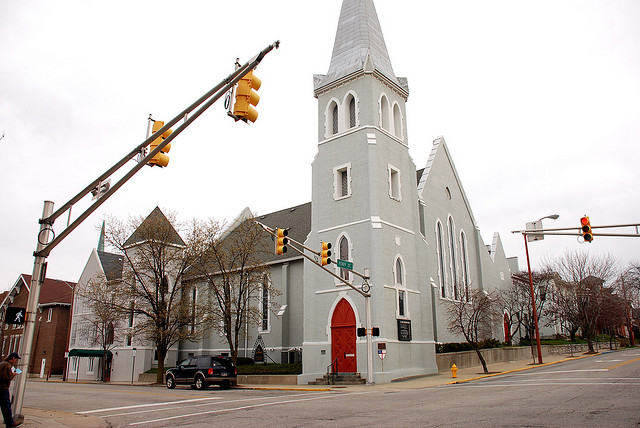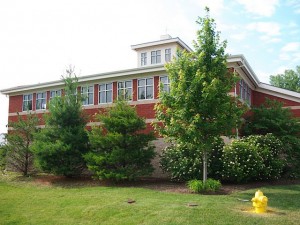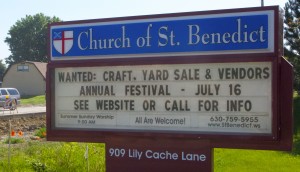I don’t post many of my sermons here. They’re better live. And who wants to read sermons?
But I’m going to break my rule because I got a lot of comments on this one and it connects to the theme of this blog – spiritual geography and being the Vicar or Priest or Church to the place where you live. But if you can’t stand the idea of reading a sermon, I excerpt the core paragraph first, so you don’t have to read the whole durn thing to get the basic idea. I preached it last Sunday night at my friend, Bradley’s Celebration of New Ministry as the new rector of St. John’s, Lafayette, Indiana.
In our Anglican tradition, we speak of churches as “parishes.” In the Church of England, a priest and a church belong to a geographic area. The parish includes everyone in it, whether they’re churchgoers, atheists, Muslims, or not sure what they think. A Church of England belongs to everyone within its parish boundaries. Priests there like to say, “I want everyone in my parish to know me, even if I can’t know all of them.” Now, what if it wasn’t just priests who said that but the whole Church: “I want everyone in our neighborhood to know us, even though we can’t know all of them; and to know that we care about them, that we respect them, that Jesus lived and died as one of them and not only as one of us.”
I confess, I’m not sure my own congregation could say that we are a parish for everyone within the boundaries of Bolingbrook. I might name another wonderful local church – a large, evangelical church with a pastor and his wife who are wonderfully active in Bolingbrook – its high school especially. I really admire them – Ken and Chrystal Hansen of Living Water Community Church. Their church is active, diverse, and very much out and about in Bolingbrook.
St. Benedict is a bit of an oddity in our community – a small, mainline church with a building you might not notice, a denominational name that most people around here haven’t heard of much less pronounce, and a group of folks who might not fit in a church otherwise, in this community with so many evangelical churches. One new member once said, “Everyone here seems like they are quirky in some way.” But we do seek to open our doors to people – on Sundays, for our Pet Blessing and “Ashes to Go” on Ash Wednesday, for our Winter Farmers’ Market, and to gay and lesbian people and families, which I don’t believe many churches in our community do. But I don’t think anyone would consider St. Benedict “a parish for the whole village.” Actually, a family looking for a baptism at our church stumbled into the church next door by accident and when they realized they might be in the wrong place, they asked the ushers whether this was St. Benedict? The ushers replied, “St. Benedict? Never heard of it.”
On the other hand, who really notices and remembers the names of the churches they drive by?
I also confess, for myself, that although I wrote about Bolingbrook, I’m not sure anyone but my blog readers and parishioners consider me “The Vicar of Bolingbrook,” much less know who I am. Honestly, I’m a shy violet, so that’s ok with me. And I like being a contemplative pastor – someone who’s ministry is to reflect, connect, teach and lead my church for the people who do find it and who treasure the spiritual home it gives them, not like any other in our community. A church like St. Benedict may serve as a church for a minority in its community.
But I do admire churches that can be a parish for their whole community. Like Living Water. Like St. John’s, Lafayette – which has all the right assets: located in a downtown area (even in a small city), with a large staff, a noticeable historic building, and a big food pantry ministry.
So, after all the apologetics, here’s the sermon. You really don’t have to read it – I don’t mind. There are probably too many commas, btw.
September 8, 2013, Ephesians 3:1-12 (scripture quotes in bold)
It is good to be here tonight with you. I’m so very excited that you’ve called my old friend Bradley to join you in your ministry here in Lafayette – from what he tells me, you sound like a wonderfully community of Christian people. He’s told me you’re spiritually grounded, that you’ve responded to his invitation to communicate with him directly about things that concern you, that you’re passionate about your Food Pantry, that you’ve warmly welcomed him, Katie, Isaiah, Miriam, and Judah, and that he feels very much that you’re collaborators with him, not expecting him alone to do the heavy lifting of parish ministry. I’m so excited for all of you to do ministry together, to be the Church, to live out our calling as the Body of Christ, in this place and at this time. I’m honored to have been asked to preach to the congregation gathered here tonight, as we come together to bless this new chapter of ministry here at St. John’s, with my old friend, Bradley Pace.
Bradley and I have been friends since seminary, about seven years now. I want to tell you the story of my favorite gift from him, which is a battered old coffee mug. He gave this mug to me on a day when I was tearing my hair out over the clergy job search process and told him that I felt like taking one of our cafeteria coffee mugs and throwing it against one of the (beautiful, stone) walls of our seminary. Now, Bradley is a passionate visionary, but I want you also to know that he is a rule-follower; so he was rather worried that I might actually break one of the school’s coffee mugs. So, he took one of his old, beat-up mugs with the writing half worn off and left it in my mailbox with a note: “Heidi, feel free to smash this one next time you need to. – Brad.”
Brad, thank you for being so pastoral to me, and making sure that I didn’t break something I shouldn’t have. This is a good pastor, my friends.
The readings we heard today are one of the official sets of propers “for the Mission of the Church.” Now, an interesting thing is that Jesus never said much about churches, at least not directly. There are only two places in the gospels where Jesus uses the word “church,” or ekklesia in the Greek. Both are in Matthew and we didn’t hear either of them in the gospel tonight. Jesus, I think, wanted to say more about things like grace, and sacrifice, and salvation. It’s Paul, really, who taught us Christians how to be the Church. Paul who only knew the Gospel of Jesus Christ from his encounters with the Resurrected Christ and the Apostles, who were still living and teaching at that time, because he wouldn’t have read any Gospels because they weren’t written down yet. But Paul somehow knew and proclaimed through his preaching and letters what it meant to be the Church, the Body of Christ. Now, Paul said a lot of things that are hard on modern ears, about things like slavery, the role of women, and sexuality, but Paul also taught inclusivity – that there is no longer Jew or Greek, there is no longer slave or free, there is no longer male and female; that all of us, through our baptism, are one in Christ Jesus. This, according to Paul, is a core value of being the Body of Christ.
Now, the letter to the Ephesians, which we heard read tonight, claims to have been written by Paul, but there are some things in the letter that make us think it may have been written by one of his followers instead, at a later time, I won’t get into those details tonight, but even though it may not have been written by Paul himself, this passage points us to that same core message: that is, the Gentiles have become fellow-heirs, members of the same body, and sharers in the promise in Christ Jesus through the gospel.
Now, I don’t know about you, but sometimes when I hear the Bible I hear Charlie Brown’s indecipherable teacher’s voice, “Wah, wah wah, wah wah, wah wah.” So, to help us burrow more into this passage, here’s the way a fantastic Presbyterian pastor, Eugene Peterson, translates it in The Message, his colloquial Bible translation:
The mystery is that people who have never heard of God and those who have heard of him all their lives (what I’ve been calling outsiders and insiders) stand on the same ground before God. They get the same offer, same help, same promises in Christ Jesus. The Message is accessible and welcoming to everyone, across the board.
The Gospel is for us in the Church, and it is for those outside our Church. Paul talked a lot about “Jews” and “Gentiles,” but what he was really talking about was “insiders” and “outsiders,” the people we know and the people we don’t know, the people who are like us and the people who don’t seem like us. As we celebrate your church and its ministry tonight, I want to tell you, people of St. John’s, that Jesus stands in your midst, inviting you to know him and his Gospel, but he also stands at your doors, pointing you outward, reminding you that his love for you is also his love for the people outside your church, that he belongs to them just the same way that he belongs to you. As Paul says: The Gentiles have become fellow-heirs, members of the same body, and sharers in the promise in Christ Jesus through the gospel.
In our Anglican tradition, we speak of churches as “parishes.” In the Church of England, a priest and a church belong to a geographic area. The parish includes everyone in it, whether they’re churchgoers, atheists, Muslims, or not sure what they think. A Church of England belongs to everyone within its parish boundaries. Priests there like to say, “I want everyone in my parish to know me, even if I can’t know all of them.” Now, what if it wasn’t just priests who said that but the whole Church: “I want everyone in our neighborhood to know us, even though we can’t know all of them; and to know that we care about them, that we respect them, that Jesus lived and died as one of them and not only as one of us.”
This is my charge to you, people of St. John’s, and to my friend, Bradley, your priest. Your beautiful steeple beckons across the neighborhood. Your red doors are cheerful and visible. Your building is broad and commodious. Your Food Pantry invites those in need to come and be served. But how can you be a parish for your community outside the walls and doors of your building? A church that people feel is here for them and with them, even if they never walk in here? A church that doesn’t only invite people inside to hear the gospel, but who looks for the gospel on the streets around it?
Paul says, Although I am the very least of all the saints, this grace was given to me to bring to the Gentiles the news of the boundless riches of Christ … so that through the church the wisdom of God in its rich variety might now be made known.
How might you, St. John’s, radiate the good news of the boundless riches of Christ to your neighborhood?
Now, Jesus didn’t come to earth to give us more to do, or to guilt us into responsibility, or to call us to create programs for every demographic we can think of. Jesus came to call us to salvation. Being a parish to our neighbors, being a community where Gentiles and Jews are one in Christ (as well as Methodists, Disciples of Christ, Baptists, and Catholics, who I notice are also your neighbors), isn’t supposed to lead us just to more work or more committees, but to greater joy and community. Ministry is supposed to be fun. It’s supposed to light us aglow with the Holy Spirit! It’s supposed to be how we know Christ more deeply. And if there’s ever work we’re doing that isn’t leading us to know Christ more, we should quit. Jesus asks us to sacrifice, but not to wither away on the vine. We tend to think we need to do a lot when I think it’s more that we need to be a certain way, as people doing ministry in Christ’s name.
I’m going to close with another story from seminary, that speaks to just that. At Seabury, while I was there, students would sign up to cook breakfast once a month at a local shelter. I only went once, but I remember that the staff encouraged us to go out and eat with the residents, but we students mostly stayed in the kitchen and talked with each other. It was much less scary to put a scoop of scrambled eggs on someone’s plate from the kitchen than to go share it with them in the dining room. Looking back, I’m ashamed at this behavior, but I also know that I was scared. Scared that I would have anything to talk to with these men, who were mostly Black and Hispanic, who seemed so different from me, a little blond haired graduate student. But we can’t serve only from the safety of the kitchen, or from inside our church walls. Are we really known by our neighborhood, by our geographic parish, if that’s the case? And what if the people outside our church can teach us just as much about living the Gospel, perhaps, as we can teach them?
In Matthew, Jesus calls us to make disciples of all kinds of people even if we feel afraid, even if we doubt; and Paul calls us to be disciples alongside all kinds of people. You are a parish for your whole community, people of St. John’s. You can’t know everyone, but are there ways to help all of your neighbors know you?
How can this be a place where your neighbors feel the boundless riches of Christ’s grace and love beckoning to them, whether they are poor or rich, student or minimum wage worker, Methodist, Baptist, or atheist? Whether they ever even walk in your doors?
Because maybe they can help you to feel the good news of those boundless riches, too; riches that Christ is always offering to all of us.
Amen.






Sheep are utterly dependent upon the shepherd: if one
gets lost, it is unable to find its way back home. Present-day scientific
dogma doesn’t know how to measure these forces and
therefore they are not part of the current scientific model of reality.
They help us through difficult times in our relationships.